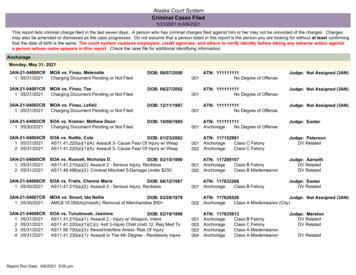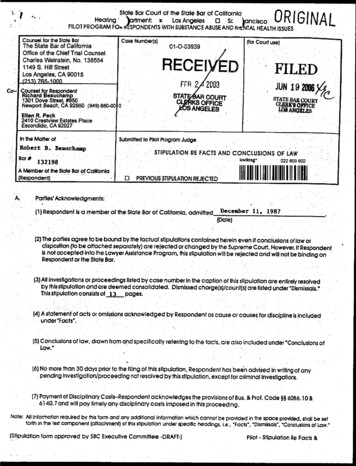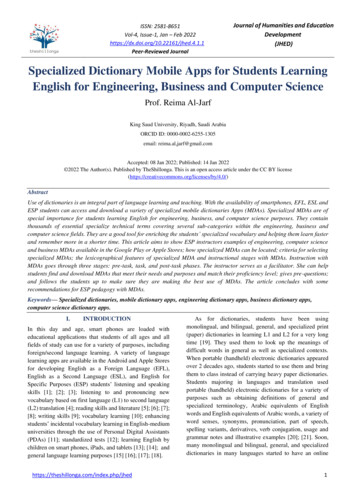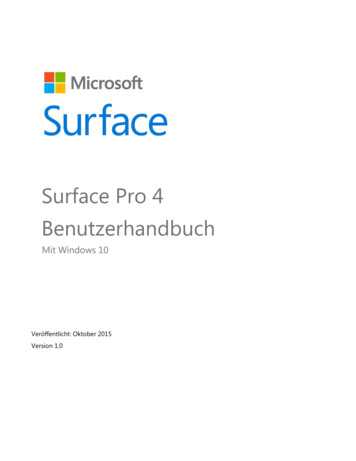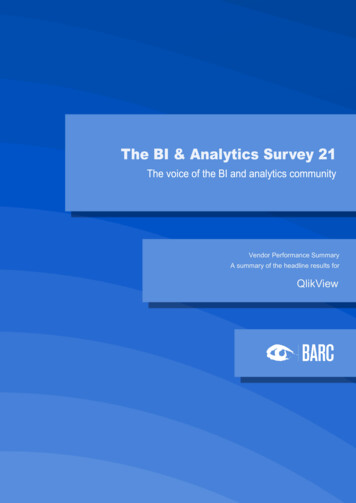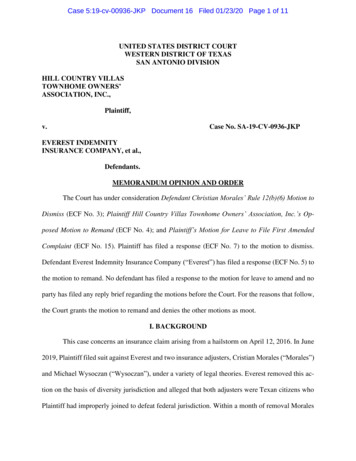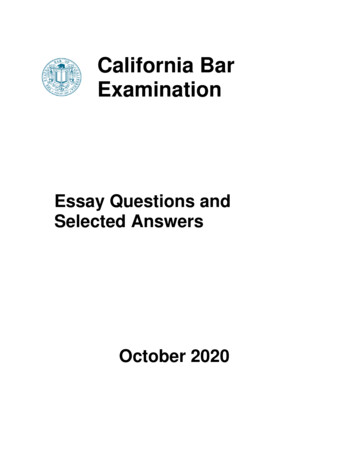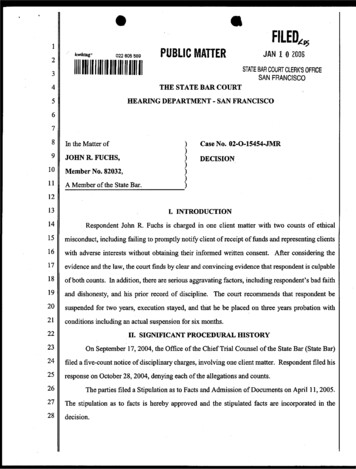
Transcription
FILED,1k’wikt 2022 605 589PUBLIC MATTERJAN 1 0 006STATE BAR COURT CLERK’S OFFICESAN FRANCISCOTHE STATE BAR COURT34HEARING DEPARTMENT - SAN FRANCISCO5678In the Matter ofCase No. 02-O-15454-JMR9JOHN 1L FUCHS,DECISION10Member No. 82032,11A Member of the State Bar.121314L INTRODUCTIONRespondent John R. Fuchs is charged in one client matter with two counts of ethical15misconduct, including failing to promptly notify client of receipt of funds and representing clien16with adverse interests without obtaining their informed written consent. After considering the17evidence and the law, the coult finds by clear and convincing evidence that respondent is culpable18of both counts. In addition, there are serious aggravating factors, including respondent’s bad faith19and dishonesty, and his prior record of discipline. The court recommends that respondent be20suspended for two years, execution stayed, and that he be placed on three years probation with21conditions including an actual suspension for six months.2223II. SIGNIFICANT PROCEDURAL HISTORYOn September 17, 2004, the Office of the Chief Trial Counsel of the State Bar (State Bar)24filed a five-count notice of disciplinary charges, involving one client matter. Respondent filed hi25response on October 28, 2004, denying each of the allegations and counts.26The parties filed a Stipulation as to Facts and Admission of Documents on April 11, 2005.27The stipulation as to facts is hereby approved and .the stipulated facts are incorporated in the28decision.
1A four-day trial was held on August 10-12, and August 30, 2005. Deputy Trial Counsel Eli2Morgenstem represented the State Bar. Attorney Diane Karpman represented respondent. Prior to3the start of trial, the State Bar moved to dismiss with prejudice counts one, two and five of the notice4of disciplinary charges. The motion was granted and those counts were dismissed. Subsequently,5during trial, the State Bar agreed to dismiss most of the allegations in the notice of disciplinary6charges that supported the dismissed counts. Accordingly, the focus of the trial was on count three7(Rules of Professional Conduct, rule 4-100(B)( 1 ))l and count four (rule 3-310(C)(2)). Following the8filing of closing briefs, the matter stood submitted for decision as of October 4, 2005.9III. MOTION TO DISMISS AND REQUEST FOR JUDICIAL NOTICE10On August 30, 2005, the fourth day of trial, respondent filed two motions: 1) motion to11dismiss count four pursuant to role 262 of the Rules of Procedure of the State Bar of California12(Rules of Procedure); and 2) request for judicial notice. The State Bar filed its opposition to the13request for judicial notice on September 8, 2005; and addressed its opposition to the motion to14dismiss in its closing brief filed on September 15, 2005.15Finding no good cause, respondent’s motion to dismiss is denied.16As for respondent’s request for judicial notice of exhibit BBBBBB (Opinion of Court of17Appeal in Castre, et aL v. Gilfillan, filed February 20, 2004), the court grants the request and takes18judicial notice of the exhibit.19IV. FINDINGS OF FACT AND CONCLUSIONS OF LAW20The following facts are based the parties’ stipulation as to facts and admission of documents21filed on April 11, 2005, and the testimonial and documentary evidence admitted at trial. The court22finds respondent not to be a credible witness based on, among other things, his demeanor at trial.23The court finds respondent’s position on various points, including that Lesley Levinson was not his24client, to be implausible. Respondent’s testimony on several key issues was inconsistent and25contradicted by his own documents. Furthermore, as set forth below in greater detail, respondent’s26own letters show his aggressive, overreaching and unethical behavior. Conversely, the court found27281All further references to "rule(s)" are to the Rules of Professional Conduct.
Lesley Levinson to be a credible wi ess, giving her best recollection of events.A.The Bush ActionOn June 30, 1990, Burt Price (Price) and Lesley Levinson (Levinson) were married.During the marriage of Price and Levinson Price acquired a mortgage lending companycalled Classic Financial Corporation (Classic Financial)./n or about 1991, respondent represented Classic Financial, Price and Levinson in a civil67matter entitled Classic Financial Corporation v. Encino Savings Bank, James D. Bush, et. al, Los8Angeles County Superior Court, case No. BC 046003 (the Bush action). On October 1, 1993, a jury9awarded damages to Classic, Levinson and Price in the Bush action. However, James Bush, one of10the defendants, filed bankruptcy and efforts to collect the judgment against him were delayed.In or about 1993, Price employed respondent to collect the judgment in the Bush action on1112behalf of him and Levinson. While respondent dealt entirely with Price, respondent was acting to13collect the money for both Price and Levinson.14On August 5, 1995, Price and Levinson separated.15In his efforts to collect, respondent filed a motion on behalf of Price and Levinson in Bush’s16bankruptcy proceeding, seeking a determination that the judgment from the Bush Action was17nondischargeable. On October 10, 1997, the court granted, in part, respondent’s motion and18determined that 98,723.13 was nondischargeable (Bush judgment).19On October 23, 1997, judgment was entered in Levinson and Price’s dissolution proceedings,20including a property settlement between the parties that was approved by the court. Pursuant to the21property settlement, Price and Levinson were to equally divide any amount recovered from the Bush22judgment, after payment of the fees, expenses and costs paid to recover. The superior court retained23general jurisdiction to resolve all disputes arising fi’om judgment.24B.The Castre Matter2252627282While many of the allegations regarding the Castre matter were dismissed by the State Bar, theevidence supporting the allegations was admitted into evidence without objection. The court f’mds thefacts and circumstances surrounding the Castre matter to be relevant because they illustrate respondent’saggressive, underhanded tactics in his dealings with Levinson. The Castre matter also illustrates theongoing conflict between Price and Levinson, and respondent’s awareness of this conflict. There also-3-
1On July 9, 1999, a Stipulation and Order (Dissolution Stipulation) was entered in Levinson2and Price’s dissolution matter to resolve issues raised by Levinson in several orders to show cause.3Pursuant to the terms of the Dissolution Stipulation, Levinson agreed to "sign over to a third party4designated by [Price] all interest in the preferred and/or common stock that she retains in Classic5Financial Corporation." (Exhibit 1, at p. 2:12-14.) The Dissolution Stipulation did not require6Levinson to initiate any legal a tion to redeem the stock.7On September 22, 1999, Price wrote respondent informing him that Levinson had agreed to8allow respondent to represent her in the issuance of a demand letter to Classic Financial regarding9the redemption of 500 shares of preferred stock. Price stated that respondent could contact Levinson10directly to confirm the agreement, but respondent never did. /n his letter, Price also instructed11respondent to send Levinson a retainer agreement and told respondent that the retainer agreement12should be 500 and increased later if litigation became necessary. In his letter, Price also instructed13respondent to give Classic Financial 10 days to redeem the shares or litigation would be initiated.14Price stated that Levinson would be assigning her interest of any collected money to an account she15would designate later.16On September 27, 1999, respondent sent Levinson a fee agreement to sign and return. The17fee agreement required an initial 500 advance for costs and expenses. The fee agreement also18provided that respondent would represent Levinson "in connection with her demand for mandatorj19redemption of her preferred shares in Classic Financial Corporation, and any arbitration or litigation20that arises from such demand." (Exhibit M, at p. 1 .)2122232425262728are several references during the Castre matter to respondent’s ongoing efforts to collect the Bushjudgment on behalf of Price and Levinson. Finally, the facts show that although Levinson signed a feeagreement with respondent, she did not authorize or tmderstand that respondent was going to file alawsuit on her behalf in the Castre matter. This is, in part, because respondent never talked withLevinson about the Castre matter at anytime prior to filing the lawsuit. There is a difference betweensigning a fee agreement that states a lawsuit may be pursued and filing a lawsuit. Respondent was takingall direction on the lawsuit in the Castre matter from Price; a fact that Price subsequently denies underpenalty of perjary in a declaration prepared by respondent, which further calls into question both Price’sand respondent’s credibility. (Exhibit JJJJJ.) Based on all the evidence, including the demeanor of thwitnesses at trial, the court rej’ects respondent’s argument that Levinson lacks credibility because sheallegedly "lied" in the Castre matter.-4-
1Around October 12, 1999, Levinson sent respondent a check for 500. On November 3,21999, Levinson signed the fee agreement sent by respondent. Levinson agreed to sign the fee3agreement because she and Price had entered into an indemnity agreement on November 2, 1999,4wherein Price agreed to hold her harmless from any and all attorney fees, costs and expenses that5may be incurred in collecting or redeeming the Classic Financial stock. Consistent with this6agreement, the 500 Levinson used to pay the retainer was from a joint account she had with Price7and the 500 was Price’s share of money from that account.8On November 18, 1999, respondent filed a complaint against Classic Financial and its9individual new owners entitled Lesley Levinson v. Michael Grant Castre (Castre), Gale Mitchell10Castro (Castro) et aL, Orange County Superior Court, case No. 817276 (the Castre matter). At no11time prior to filing the lawsuit had respondent talked with Levinson regarding the Castre matter or12the filing of a lawsuit. Respondent did not discuss the allegations in the lawsuit with Levinson o13receive her authorization to file the lawsuit.1415161718On December 30, 1999, Levinson wrote respondent saying that she had reviewed thecomplaint and directed him to stop the Castre matter litigation immediately. Levinson stated:"I feel that I am being used and manipulated by Burt through his direction to yourfirm to engage in a lawsuit against Classic Financial Corporation. I did not agree tomypersonal involvement in the filing of a lawsuit, since this was not explained to meby you or Burr- I only agreed to sign over to a third party all interest in the preferredand/or common stock I retain in Classic, although I am not sure what, if any, interestin Classic remains." (Exhibit 2.)1920Levinson insla"ucted respondent to provide documentation showing that he had withdrawn21the lawsuit. Respondent did not respond to the December 30, 1999 letter and failed to withdraw the22complaint in the Castre matter.232425On January 20, 2000, Levinson wrote to respondent again demanding that he provide proofwithin 72 hours that he had withdrawn the complaint in the Castre matter.On February 8, 2000, respondent wrote to Levinson instructing her to think carefully before26withdrawing the lawsuit in the Castre matter. Respondent told Levinson that she could be liable for27costs if she withdrew it and may be liable for malicious prosecution. Respondent also stated, "As28you know, we have discussed this situation with Burt, and we believe you would be improperly-5-
1giving up a substantial fight that he may have, to collect this money. We certainly hope you are not2instructing us to withdraw the action, out of anger or retribution against Burr, because that is not a3proper motive." (Exhibit U.)4On February 10, 2000, Levinson sent a third letter to respondent demanding that he withdraw5the complaint. Levinson again reiterated that she only agreed to sign over all interest in the Classic6Financial stock, and that she did not agree to be personally involved in a lawsuit. As for the lawsuit,7Levinson stated:8910"I was under duress at the time of my signing your agreement and the retainer I sentto you was Burt’s money from a previously held joint account, all of which youknow. You are representing Burt in this action - your conversations have been withhim, I have never spoken to you regarding this. He has agreed to pay your bills asthis action is solely for his financial benefit, per his letter to me. My actions werebased on this.letter and agreement from Burr." (Exhibit 4.)11121314On March 31, 2000, Levinson wrote respondent regarding his failure to withdraw thecomplaint in the Castre matter and again demanded that the complaint be withdrawn.On March 31,2000, respondent wrote Levinson a letter regarding her demand that respondent15withdraw the complaint. Respondent toldLevinsonthatheunderstoodthe funds being sought inthe16Castre matter were for Price’s son, Daniel. Respondent wrote:171819"As you know, Burt has provided assistance in this matter by providing documentsand explaining the situation to me. While we cannot provide legal advice to you inyour dealings with your ex-husband and his son, because we have an obviousconflict, we suggest to you that you should determine if the withdrawal or dismissalof your lawsuit will expose you to legal liability from Burt and/or Daniel, for refusingto follow through on an agreement to recover these monies.20212223We would think that you would want to avoid further litigation, and in that regard,we have been making efforts since your fu’st letter to seek a method for extricatingyou as a Plaintiff from this lawsuit, while preserving the ability to collect this money.Aider reviewing the documents, it is our belief that you can either assign the preferredshares or assign the right to redeem the monies owed for the redemption of theseshares. We think this is the appropriate way to go and that Daniel would be theappropriate assignee.24252627 . Please advise me if the foregoing is acceptable, otherwise, if we are required tosimply dismiss this case, we cannot predict, nor can we advise, that such conduct willbe without consequences. Among other potential consequences, the Defendants mayvery well sue you for malicious prosecution, and they could conceivably name meand my fwrn as well. Please consider the foregoing very carefully and consider thatthis proposal represents, in our view, the best way to continue with the claim formoney without your direct involvement." (Exhibit Y, at pp. 2-3; emphasis added.)28-6-
1In response to another demand by Levinson to dismiss the complaint in the Castre matter,2respondent wrote to Levinson on April 10, 2000. Respondent stated that he recognized his3obligation to comply with Levinson’s instructions to dismiss the complaint, but stated that he woul4not do so until Levinson communicated the "real reasons" for her decision. In the letter, respondent5stated that he suspected that Levinson wanted to withdraw the lawsuit because either the defendants6in the lawsuit had threatened her, or she now wished to deny Price or Daniel the benefit of the7lawsuit that she agreed to pursue for them. Respondent warned Levinson that dismissal of the8lawsuit could expose her to having to pay the defendant’s costs; a malicious prosecution action by9Castre and Castro, including a possible cross-action for indemnity by respondent’s law firm if it were10named; and to liability to Price for her failure to pursue the matter. Respondent concluded by11stating: "Please understand that our ethical responsibilities to you require us to. follow your12instructions except when your instructions may result in more damage than not following th13instructions." (Exhibit Z, at p. 3; emphasis in the original.)14On May 5, 2000, respondent again wrote to Levinson, stating that he still had not heard from15her on whether she wanted him to pursue the Castre matter or prepare papers to assign her rights to16Daniel. Respondent also stated that Levinson owed him in excess of 2,500 for attorney fees due17on the Castre matter.18In his May 5th letter, respondent also addressed his ongoing efforts to collect on the Bush19action. Respondent stated that he and Price wanted to pursue execution of the judgment by directing20the sheriffto sell Bush’s house. Respondent told Levinson that her share of the expenses would be21about 750 and that she should pay it as soon as possible. Although respondent was representing22both Levinson and Price in the collection of the Bush action, ’espondent also conveyed the following23offer on behalf of Price to Levinson:2425"If you are not interested in paying your share of the expenses to pursue thisjudgment, Burr has indicated that he will pay all of the expenses in return for anassignment of your right to receive half of any proceeds recovered from Bush."(Exhibit 8.)262728On May 12, 2000, attorney Michael L. Michel wrote respondent on behalf of Levinson,demanding that respondent dismiss the Castre matter.-7-
1On June 20, 2000, respondent responded to Michel’s letter. Although respondent contends2that he is representing Levinson and "her right" to recover an amount in excess of 70,000,3respondent continues to suggest that Levinson assign her rights to Daniel Price, "or to some other4person who is willing to prosecute this matter on her behalf." (Exhibit CC, at p. 2.) Rather than5dismiss the complaint, respondent offers to waive his outstanding attorney fees bill if Levinson6assigns her rights to someone else:789’qf she is willing to do so, we will release her from any obligation to pay future fees,and we will agree to look to the recovery or to the assignee for the present balance,such that if there is a sufficient recovery to pay our fees or the assignee agrees to paythem, Ms. Levinson will not be liable for the existing amounts due. We would lookto her for the 4,289.34 presently owed only in the event that there is no recovery orno payment by the assignee." (Exhibit CC, at p. 2.)1011In his June 20th letter, respondent again warned about a possible legal action brought by Price12against Levinson regarding the Classic Financial stock if Levinson dismisses the Castre matter.13Respondent states:1417"Obviously, we cannot make any such demand on behalf of Mr. Price, nor can werepresent him in any such lawsuit. However, we understand that he is prepared toseek recovery of the 70,000 or so owed on these preferred shares if Ms. Levinsonhas somehow disposed of or denigrated her rights in that stock, and we feel that youand she should be reminded of those provisions and of the potential threat before youdemand that the lawsuit be dismissed, so that she does not expose herself to anotherlawsuit while attempting to rid herself of this one." (Exhibit CC, at p. 2.)18Thus, respondent asks that Michel "immediately advise us of any action Ms. Levinson may151619have taken with respect to the preferred shares that may have compromised our efforts to recover the20amounts due to her." (Exhibit CC, at p. 2.)21Levinson ultimately agreed to assign her rights to the Classic Financial stock to Daniel Price.22On August 9, 2000, the court issued an order allowing Daniel Price to substitute in as plaintiffin the23Castre matter.24On August 11, 2000, respondent wrote to Michael Michel, thanking him for his cooperation25in obtaming Levinson’s assignment to Daniel. Respondent also stated that he mayneed a declaration26from Levinson to support a summary judgment motion in the Castre matter. Respondent also stated27Levinson still owed his firm over 4,000 in attorney fees fi’om the Castre matter that she need to pay.28Finally, respondent stated that he was still waiting for Levinson’s share of the expenses, 750, to-8-
1proceed with the execution of the Bush judgment.2On August 14, 2000, Michel replied to respondent’s letter, stafmg that Price was solely3responsible for the legal fees in the Castre matter and that respondent should seek recovery t om4Price.56Pursuant to respondent’s request, on October 4, 2000, Levinson signed a declaration tosupport Daniel Price’s summary judgment in the Castre matter.7On or about June 18, 2001, the court in the Castre matter granted the defendants Castre and8Castro’s motion for summary judgment in the Castre matter, and ordered that the defendants recover9their costs of suit from the plaintiff?10C.Collection on the Bush Judgment11On March 7, 2001, respondent wrote to Levinson regarding his efforts to collect on the Bush12judgment. Respondent stated that he had been representing Levinson and Price for the past nine13years in an effort to collect on thejudgrnent. Respondent stated that although the judgment exceeded14 120,000, that amount was subject to respondent’s 40% contingency fee4 and Price’s reimbursement15for any costs he paid over the years. Respondent also stated that Price wanted to buy out Levinson’s16share of the settlement and that Price had authorized respondent to make Levinson an offer.17In particular, respondent stated that Price was willing to pay Levinson 5,000 and assume18responsibility for the legal fees that respondent claimed Levinson owed respondem for the Castre19matter. Respondent stated that he had not reviewed his bills to determine the exact amount of20attorney fees Levinson owed prior to her assignment of rights to Daniel, but respondent thought the21amount due was "in excess of 20,000.’’5 (Exhibit 9.) Thus, respondent represented that Price was222324252627283Respondent and Price testified that the summary judgment motion was granted based on adeclaration Leviason provided to defendants Castre and Castro that contained misrepresentations.Accordingly, prior to June 18, 2001, respondent was aware of a conflict of interests between Price andLevinson.4This was incorrect. Respondent’s contingency fee was only one-third.SAs set forth above, on August 11, 2000, after Levinson assigned her fights to Daniel, respondentwrote a letter to Michel asking when Levinson would be paying respondent’s bill for attorney fees in theCastre matter which bill "exceeds 4,000." (Exhibit HI-L)-9-
1offering in excess of 25,000. Respondent stated that this amount was "nearly as much as2[Levinson] would be paid on the judgment if it were satisfied in full by Mr. Bush now." (Exhib39.) As for Price’s offer, respondent went on to state:45"On the other hand, if Mr. Bush agrees to pay a discounted amount, or if it takesmonths or years to recover on that judgment, which is possible, the effective amountyou might receive in the future may actually be less than what Burt Price is nowoffering you.611Please understand that because I have represented you both in the Bush case for thepast nine years or so, I have a conflict and therefore cannot make a recommendationone way or the other to you regarding this matter. I therefore suggest that if you wishto obtain legal advice regarding this offer, you should consult another lawyer. If youhave any questions, you are certainly free to call Burt and discuss it with him.However, as an observer of your and Burt’s relationship over the years, it appearsthat you two are not exactly on the best of terms at this point, and perhaps it wouldbe better for both of you if some resolution of this matter is reached, so that both ofyou can move on and will no longer have to communicate with each other in thefuture." (Exhibit 9.)612On April 12, 2001, respondent wrote Levinson again and said that since he had not heard7891013from her in response to Price’s offer, Price had withdrawn the offer. Respondent ftLrther stated that14Levinson owed his fn’m 6,495.01 for attorney fees in the Castre matter. Respondent stated that if15there was any recovery on the Bush judgment, of which Levinson was entitled to one-third,16respondent would deduct his bill in the Castre matter from that recovery. Respondent stated that if17Levinson disagreed with respondent’s right to recover on his bill, she should advise him of her18objection immediately.19On April 17, 2001, Levinson wrote to respondent, objecting to respondent’s claim to recover20attorney fees from the Castre matter out of any recovery from the Bush judgment. Levinson21reiterated her position that she did not owe respondent any attorney fees from the Castre matter and22that Price had agreed to pay all the fees in that proceeding.2324Between March 30, 2001, and June 13,2001, respondent wrote at least four letters on behalfof Price and Levinson, seeking to recover on the Bush judgment based on proceeds from the sale of252627286It appears that at the time respondent wrote this letter to Levinson, respondent and Price mayhave been aware of the pending sale of Bush’s home and the likelihood of recovering at least 120,000on the Bush judgment. (See, Exhibits 12, 13 and 27.) However, the State Bar did not sufficiently pursuethis issue at trial.-10-
1Bush’s home. On behalf of Price and Levinson, respondent made three demands for payment and2at least one settlement offer to recover on the Bush judgment.34On June 15,2001, respondent received 126,000 from the escrow of the sale of Bush’s home,and respondent deposited the funds into his client trust account.5On or about June 18,2001, respondent disbursed to Price his undisputed portion of the funds6received in the Bush action, which was 42,000. On or about June 25, 2001, respondent disbursed7to himself his undisputed portion of the funds, which was 42,000.8At trial in this proceeding, respondent produced a letter purportedly prepared by Price to9respondent dated June 18, 2001. The letter states that Price was "filing a claim against any and all10funds held" by respondent for Levinson. (Exhibit KKK.) Price stated that his "claim" was based11on fi’and charges he intended to file against Levinson for misrepresentations she allegedly made i12her declarations filed in the Castre matter. Price had not yet filed any such lawsuit. Price asked13respondent to contact him if respondent was "UNABLE to freeze and/or hold these funds until my14action is started." (Exhibit KKK; emphasis in original.)15D.Respondent Refusal to Pay Levinson Her Share of the Judgment16On October 8, 2001, respondent wrote Levinson to notify her that his fn’m had collected17 126,000 on the Bush judgment. This was the first time that Levinson learned of the funds.18Respondent told Levinson that her portion was 42,000. However, respondent stated that he would19not be disbursing the 42,000 to Levinson because Price intended to file an action against Levinson.20At the time of respondent’s letter, Price still did not have a valid lien or a pending action agains21Levinson.22In addition to Price’s "claim," respondent also stated that his firm had a lien and claim23against the money respondent was holding in trust for Levinson based on: 1) the attorney fees24respondent claimed Levinson owed him for the Castre matter; and 2) respondent’s belief that25Leviuson committed fraud and perjury in her declaration that was filed in support of the defendants’26summary judgment motion in the Castre matter, wherein she allegedly claimed she did not retain27respondent’s firm and never authorized the lawsuit. (Exhibit 15.)28Levinson hired attorney Annee Della Donna to try and recover Levinson’s share of the Bush-11-
1judgment fi’om respondent. On November 2, 2001, Della Donna wrote respondent regarding the2 42,000 he was holding in mast. Della Donna stated that Price did not have a valid lien based on his3allegations of fraud in an unrelated matter. As for respondent’s fee dispute and allegations of fraud,4Della Donna stated that those claims should be resolved in fee arbitration and that respondent was5required to immediately disburse the funds not in dispute.6In February 2002, based on respondent’s contentions that Levinson owed him 6,495.01 in7attorney fees stemming fi’om the Castre matter, Levinson filed for fee arbitration with the Beverly8Hills Bar Association.9On May 29, 2002, respondent wrote Levinson’s attorney, Della Donna, regarding Price’s10intention to file an action against Levinson based on his allegation that he was defrauded in the11marital dissolution action in regards to the Classic Financial stock.7 Respondent stated that beca12of his knowledge of the facts regarding the Classic Financial stock, Price asked respondent to13represent Price in his action against Levinson. In his letter, respondent asked that Levinson waive14the conflict of interest so that respondent could represent Price. As for respondent’s request that15Levinson waive the conflict, respondent states:1617181920"We suggest that you should approach this issue with care, because an assertion thatwe cannot represent Mr. Price because we previously represented Ms. Levinson ina related matter, will not only require you to disclose the confidential information youallege that we received, but it will be an admission that we are in fact owed 6,495.01 by Ms. Levinson for our services. If you contend to the contrary, in orderto avoid liability for the fees and costs due to us, you may actually be exposing herto liability to Mr. Price for 50,000 or more, because there is little question, basedupon Ms. Levinson’s deposition and second declaration [in the Castre matter], thatshe defrauded her ex-husband by agreeing to transfer stock that she later claimed shenever owned." (Exhibit 17, at p. 2.)212223Respondent concluded by suggesting that to resolve all outstanding issues, Levinson "simplywaive her claim to any portion of the 42,000, thereby allowing us to cancel the mediation, cancel2425262728 Respondent described Price’s claim as follows: "Burr Price, who is a client of this firm, hasasserted a claim against the
On January 20, 2000, Levinson wrote to respondent again demanding that he provide proof within 72 hours that he had withdrawn the complaint in the Castre matter. On February 8, 2000, respondent wrote to Levinson instructing her to think carefully before-5-


